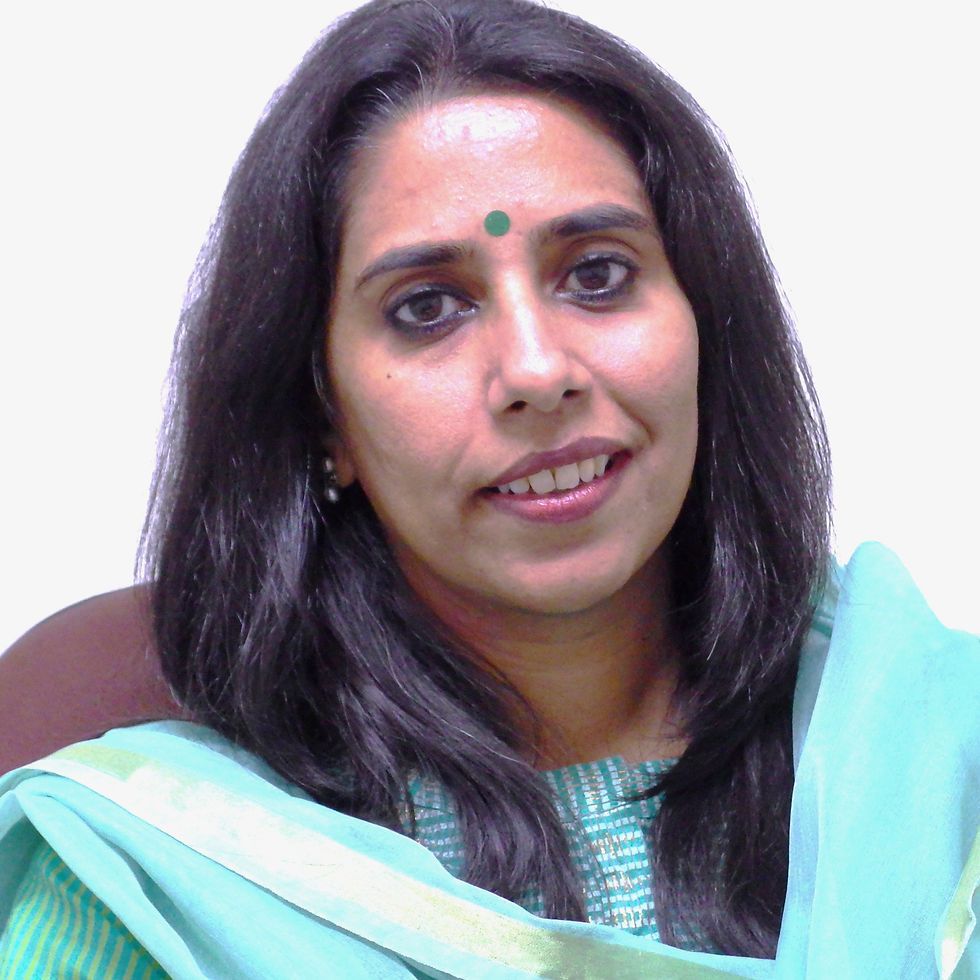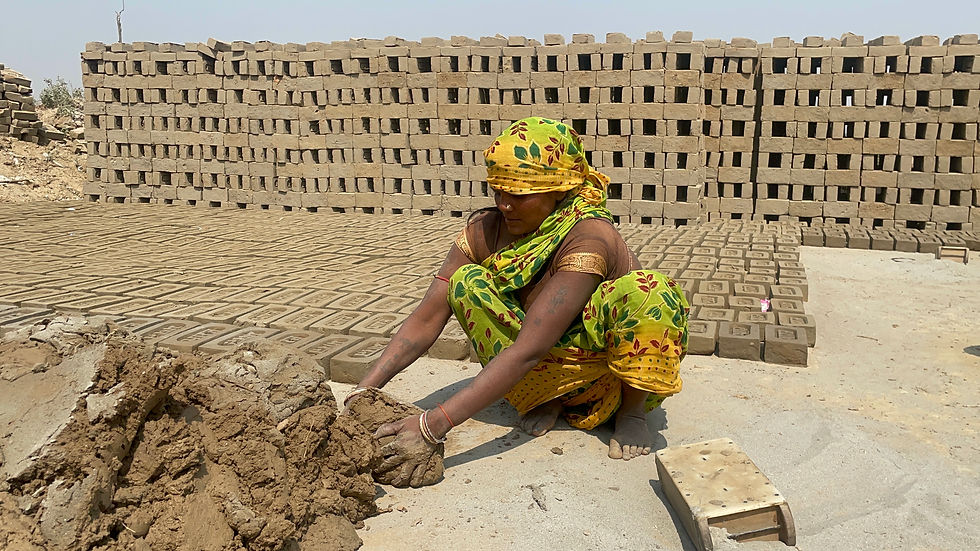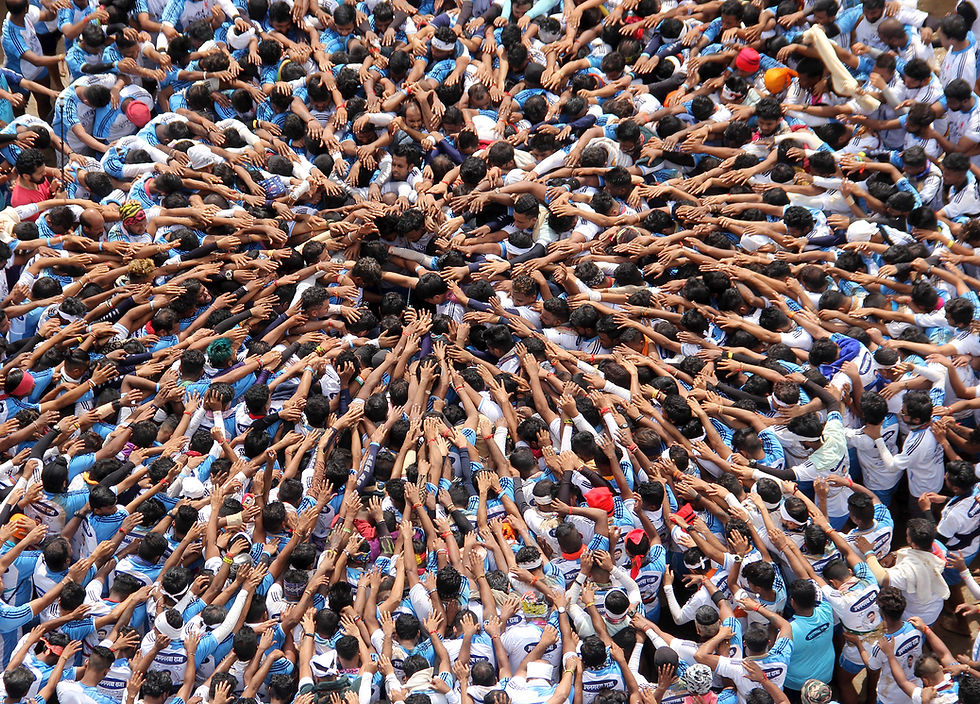How Musahar women in Varanasi brick kilns are reclaiming the right to breastfeed
- Aug 7, 2025
- 7 min read

As the World Breastfeeding Week (August 1–7) concludes today, we take you to brick kilns of Uttar Pradesh where informed choices, community support, and mothers’ courage are building a healthier future for children.

Soha Moitra

File Picture
“It was mid-noon and we were working under a scorching sun, when suddenly I heard a shrill cry. My baby was crying. I rushed to the makeshift brick shed, and just as I started feeding her, a hoarse voice roared from outside. It was our supervisor, asking me to return to work. ‘Bacchi ko dudh pilane se ita banana jyada jaruri hai – dudh pilane se tera pet chalega kya? (Making bricks is more important than feeding your newborn – will nursing her sustain your job?)’”
The young mother was visibly angry while narrating her experience at the workplace. “But I believed otherwise,” she continues, “For me, it was my right and priority to nurse my baby, whenever and wherever required. The man kept shouting. Finally, I mustered all my courage and answered firmly, ‘Brick-making can wait, but my baby cannot.’”
“I was immensely happy and worried, both at the same time, to have said this,” she smiles, “happy because I said exactly what the mother in me prompted me to say, and worried because my confidence could have easily been mistaken for stubbornness and might have cost me my job.”
Meet Kajal (name changed to protect identity), the confident young mother from a Musahar basti (settlement) in Varanasi. But her confidence wasn’t born overnight. Like the bricks she moulds, her journey from internalised inferiority to self-assertion took time. Today, she is one of many young mothers reclaiming their right to maternal health and child nutrition in some of the toughest working conditions imaginable.
However, her quiet act of defiance is far more than a mother’s assertion. It is a powerful expression of agency by someone who, in every conventional sense, has been systematically denied it. As a woman from the Musahar community – one of the most socially ostracised and economically oppressed groups in India’s social fabric – Kajal sits at the intersection of multiple layers of marginalisation. Her decision to prioritise her newborn’s needs is an audacious act of reclaiming dignity by someone coming from the grassroots – something that challenges centuries of social and gender hierarchies that have long dictated silence and submission.
Life at the Kilns: Working Against the Odds
Across the blocks of Harahua, Badagaon, Pindara, and Arajiline in rural Varanasi, over 335 Musahar families live and work in the brick kilns, for which they have to migrate to far-off villages. Among them are 103 pregnant women (as per data collected in 2024) and over 300 children under the age of five. Life here is gruelling, to say the least – with long hours under the scorching sun, cramped makeshift shelters with no ventilation, electricity or privacy, and frequent dehydration and illness – all while trying to keep their jobs and care for their children at the same time.
“We had no choice. Even during pregnancy or right after giving birth, we were expected to work,” shares one mother. “With no time or support, babies were given tea or diluted milk instead of breast milk.” That’s the reason why so many fell ill — with malnutrition, stunting, and anemia being common among these children.
Migration has cut mothers and children off from essential services like Anganwadi (ICDS), Primary Health Centres (PHCs), and Village Health and Nutrition Days (VHNDs). In 2022, only 43 of 112 pregnant women from these kilns had institutional deliveries, while just 60 of them completed the recommended four antenatal care (ANC) check-ups.
That year, four infants, three newborns, and four older children died. Out of 124 children under the age of one whose parents migrated to the kilns, only eight were fully immunised. Just nine received a colostrum (the first milk of the mother, produced immediately after the child is born) feed, and only 15 were exclusively breastfed.
How Does Migration Cut Mothers And Children Off From Essential Services?

File Picture
Due to the seasonal migration of families to brick kiln industries, often for seven to eight months, pregnant women and young children face critical disruptions in accessing essential health and nutrition services. In their villages, these women and children are registered at their village Anganwadis for ration, child nutrition monitoring, and pregnant women are ensured visiting Village Health and Nutrition Days (VHNDs) and Sub-Health Centres (SHCs) for antenatal care and timely vaccination.
But, prolonged absence due to migration leads to significant service gaps, as they are unable to collect their entitlements, attend antenatal check-ups, or receive timely vaccinations. As a result, children are left without complete immunisation coverage, and pregnant women often undergo home deliveries, which not only increase health risks but also exclude them from receiving benefits under the Janani Suraksha Yojana (JSY).
A Turn Towards Change: Awareness and Access
Recognising the urgent need for intervention, CRY – Child Rights and You, in partnership with Jan Mitra Nyas (JMN), a local community-based organisation, began working across 50 villages in the region quite a few years back. Their outreach now covers 5,849 children, including 721 under-fives from 983 Musahar households in 28 highly vulnerable villages.
The intervention focused on increasing awareness around maternal health, exclusive breastfeeding, and childcare through sustained behaviour change sessions. Mothers were counselled on the importance of breastfeeding, newborn nutrition, and accessing health services even while migrating. To tackle the issue of health service exclusion, migrant families living at brick kiln sites were linked to VHNDs in nearby villages to ensure routine immunisation and antenatal care.
Efforts were also made to improve conditions through collaboration with brick kiln owners – many agreed to provide rest time to pregnant women. Families were helped to collect Take-Home Rations (THR) from Anganwadi Centres to supplement their diets. In tandem, local ANMs (Auxiliary Nurse Midwives) and PHC (Primary Health Centre) staff were contacted to bolster health outreach efforts in Musahar-dominated settlements.
Kusum, a young mother from Barhikala Musahar Hamlet who works at one such kiln, recalls, “My first child was always sick – I didn’t know why it’s important to feed her from time to time. It was the ANM Didi who explained it all and helped me understand how breastfeeding protects my child’s health — not only by providing her the most nutritious food but also by building her natural immunity.”
Visible Impact: From Data to Determination
By 2024, the impact of these efforts became visible in the numbers. In the 25 brick kilns across Badagaon, Harahua, and Rural Varanasi blocks where interventions were most concentrated, the percentage of institutional deliveries rose significantly. Out of 75 reported deliveries of pregnant women where families were staying at brick kiln premises, 49 were institutional deliveries (65.33%) – an increase from 43 institutional deliveries out of 79 total deliveries (54.43%) in 2022 (excluding private hospital deliveries). Child immunisation also improved, increasing from 6.45% in 2022 to 20.14% in 2024.
Notably, colostrum feeding rose from just 9 to 38 children, and exclusive breastfeeding saw a substantial jump from 15 to 56 children during the seasonal stay at the brick kilns. Infant deaths fell from four to two and, most hearteningly, no child deaths were reported in 2024 — down from two in 2022. Incidents of malnutrition among children also declined, from 15.58% to 12.14%.
The Larger Perspective: How Does The Macrocosm Look Like
Even though improvements against many health indicators related to women and children are visible in the kilns around Varanasi where CRY and its partner organisations are working, the overall improvement is still a distant cry. Given the fact that India’s brick kiln sector is vast, majorly decentralised and unorganised in nature, it’s difficult to get a comprehensive and authentic database to ascertain the workforce strength involved in this sector.
As the government data from February 2023 suggests, there are about 140,000 registered and unregistered brick kilns in the country. Going by a conservative assessment of the workforce involved in each of these units, 30 to 150 families are found to work in each kiln, which varies depending on the size and optimum production capacity.
Assuming just 2 persons (the man and the wife) from each family are engaged in the production process, the average number of workers in each kiln is somewhere between 60 to 200, eventually supporting a workforce of 84 Lakhs to more than 2.5 crores approximately, nearly half of whom are women.
From Isolation to Inclusion
Earlier, Anganwadi Workers (AWWs) and ANMs rarely visited the Musahar bastis, and many families faced social stigma and neglect. But things are changing. Through improved coordination, government frontline workers are now more visible and proactive. Health and nutrition services have become more accessible, helping women and children from Musahar communities reclaim their rights with dignity and confidence.
As Dr. S. C. Maurya, Additional Chief Medical Officer (ACMO) of Varanasi, aptly puts it: “Breastfeeding is the first vaccine, the first shield, and the purest bond between a mother and her child. It protects mothers from breast cancer and gives babies a stronger, healthier life. No medicine, no formula drink, no supplements can match the mother’s milk.”
Sustaining the Momentum
With encouraging outcomes already in sight, the work continues. JMN and CRY, with support from the local administration, are now planning future interventions to deepen and sustain the impact. These include ensuring regular visits by ANMs and mobile health facilities to the brick kilns, creating child-friendly learning spaces, and strengthening healthcare services for pregnant women and newborns through VHND and RBSK (Rashtriya Bal Swasthya Karyakram, a GoI initiative under the National Health Mission) teams.
There’s also a growing emphasis on kitchen gardens to promote low-cost, sustainable nutrition, and on continuing community awareness campaigns around exclusive breastfeeding, maternal care, and child nutrition during work hours.
Toward A Healthier Tomorrow
This World Breastfeeding Week, stories like Kajal’s remind us of a simple but powerful truth: every child deserves a healthy start, and every mother deserves the right to provide it. In the heat and hardship of Varanasi’s brick kilns, Musahar women are quietly laying the foundation for a stronger, healthier future – one child, one mother, one act of courage at a time.
Soha Moitra is Director, CRY – Child Rights and You (North)





Comments